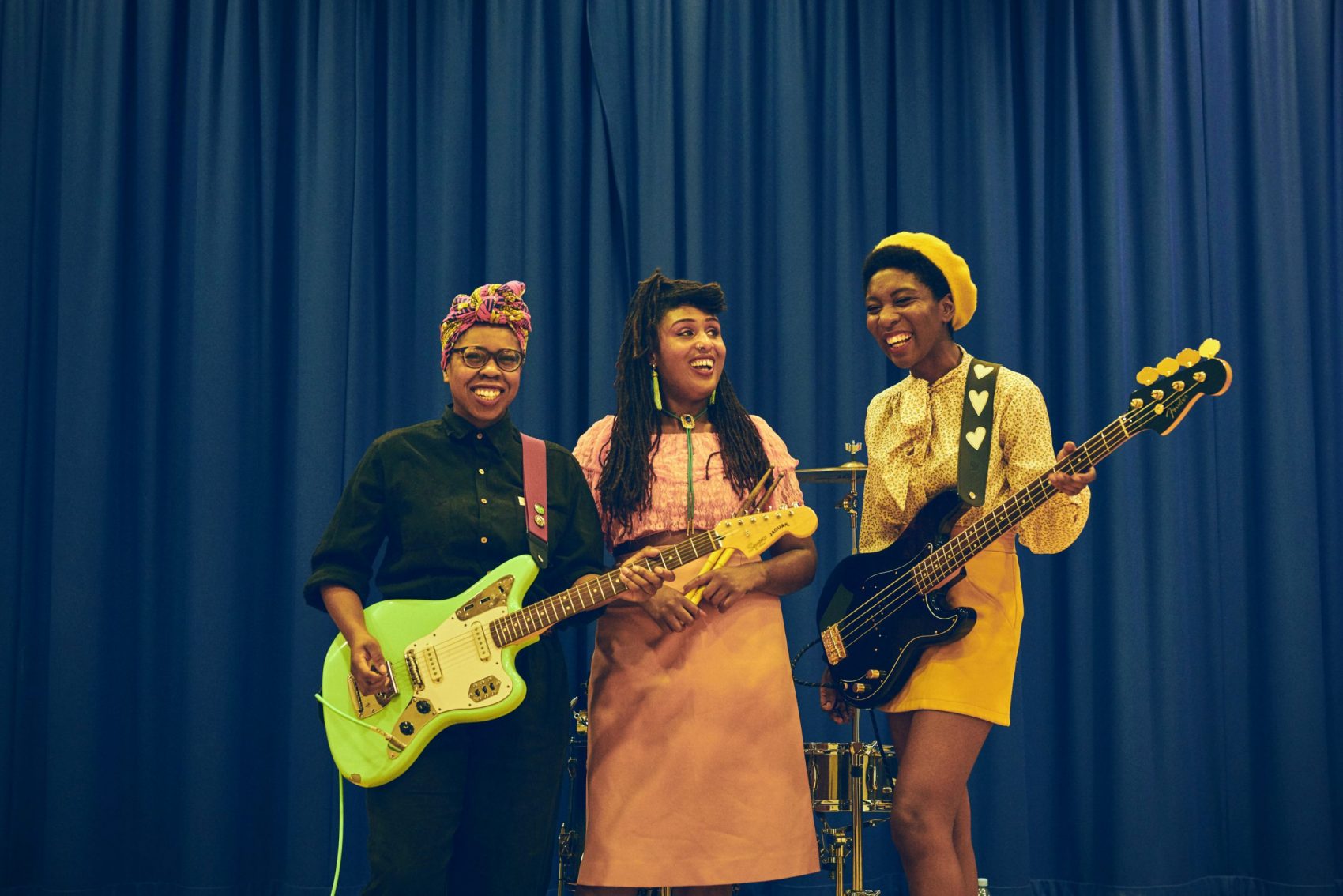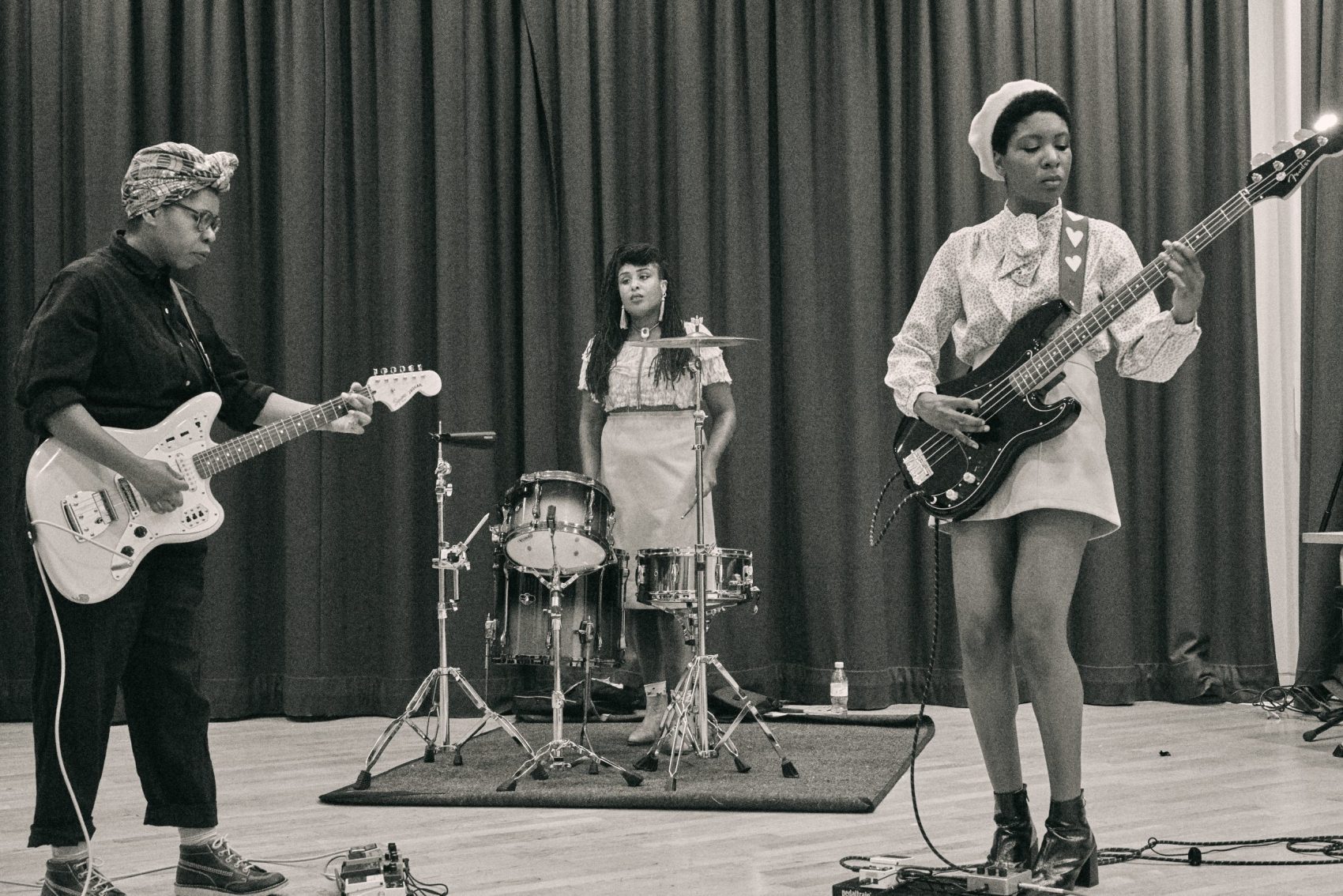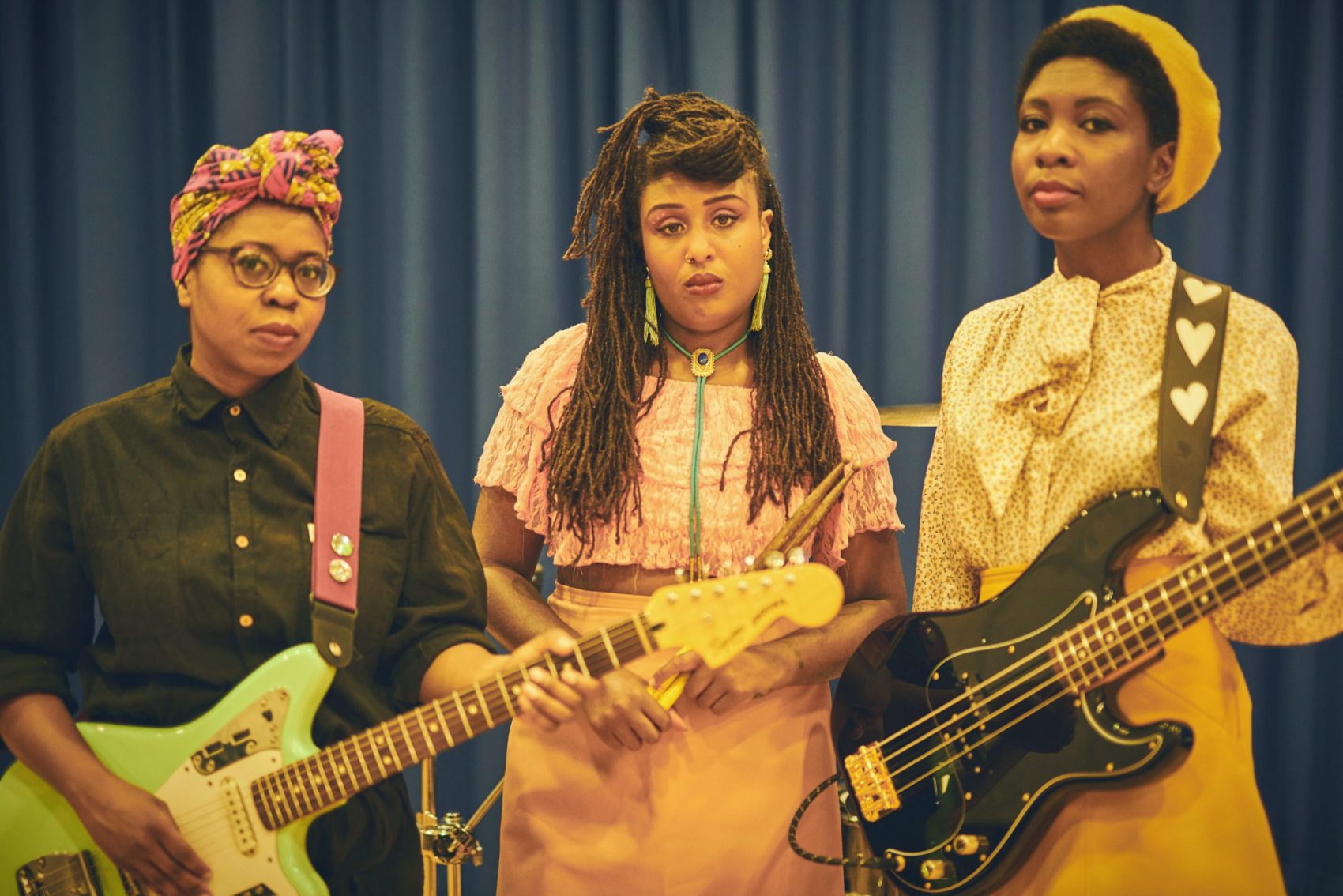
Black women have been at the forefront of rock n’ roll since Sister Rosetta Tharpe. Continuing that legacy in the United Kingdom are self-proclaimed “Black Feminist Sister Punk” trio Big Joanie. Made up of Stephanie Phillips on guitar, Chardine Taylor-Stone on drums, and Estella Adeyeri on bass—all three contribute vocals—the band have been making efforts since 2014 to diversify a White punk scene in the U.K. and beyond and have made a name for themselves with a music grounded in the free-wheeling punk tradition.
Their breakthrough came with 2018’s Sistahs. A punk record through-and-through, it deals in the depths of desire, love, and longing with a devil-may-care attitude, with a sensitivity strained through warbled and fuzzed-out guitar. Not ones to stray from an experiment, the band has a history of crafting some gnarly covers by prominent Black femme artists, from a roiling reimagining of TLC’s R&B classic “Scrubs” to a recent and particularly soaring rock take on Solange’s “Cranes in the Sky.”
Outside of their own music, the band is immersed in a mission to bring BIPOC and femme punks to the front, from Adeyeri’s efforts volunteering with the London branch of Girls Rock to their combined efforts running Decolonise Fest. Founded by bandmate and journalist Phillips’, the festival runs with a tight-knit DIY spirit and an emphasis on featuring punks of color from showcases to workshops.
“We wanted race in DIY to be something that people aren’t afraid to confront and acknowledge that maybe they’re not doing enough to make their spaces inclusive,” Adeyari tells LADYGUNN. “It’s frustrating if you’re making your DIY space hella queer friendly or friendly to people who aren’t cis-men, but then you’re not thinking about race or accessibility. For us, it’s making sure that’s part of the conversation.”
LADYGUNN spoke to Adeyeri about what the band’s been up to, putting their spin on “Cranes in the Sky”, and their efforts to decolonize and diversify punk music worldwide.
HOW DID THE IDEA FOR THE “CRANES IN THE SKY” COVER COME ABOUT?
I think for Steph particularly A Seat At The Table is a really influential album. Everything around that was such a big influence for us. It was a long time ago that we thought we should try and cover that song because we’ve been playing it; we played it live at SXSW last year. I remember at practice we tried to cover this song, so I got the tab and stuff—it looked hard and quite funky. Chardine was like “it’s a cover, we don’t have to play it exactly how it sounds. We should be playing it so that it sounds like a Big Joanie song.” The original is so beautifully crafted, so we approached this by making it our own, kind of like what we did for the TLC cover. We worked that song so that it felt more akin to how we would deliver it. It’s one of our favorites, so it was fun to be able to add that to the live set. There’s always that moment where people are listening and then they start singing and they’re like “I know that song” Especially having more and more people of color in our audiences and being able to crank out this song really means so much to all of us.
HOW LONG HAS IT BEEN SINCE BIG JOANIE PLAYED A SHOW, WITH LONDON STILL ON LOCKDOWN?
Our last show was the first weekend of March, for International Women’s Week. We played a gig in Folkestone. Just a few days before we’d had the gig with Sleater-Kinney in London, one of the last tours that was able to complete before everywhere started shutting down. We were going to try an outdoor distance thing in August to celebrate the launch of this single, but obviously picked the weekend where there was a massive storm. We ended up just recording a live set and had a distanced listening party. The single and the Sistahs album were playing in this courtyard and people could buy the single and mingle and stuff. We had to have limited numbers because of COVID, and everyone had to wear masks. That was the closest we’ve got to it. There’s a lot of government guidelines that have been in place to try and get gigs to be a thing again, but I don’t know how much is going to happen before next year.

PUNK MUSIC EXISTS AS AN UNAPOLOGETICALLY LOUD FORCE, A HURRICANE OF PEOPLE UP-CLOSE DANCING AND SWEATING AGAINST EACH OTHER. DO YOU THINK THAT CAN EVER EXIST AGAIN?
I hope so. I missed seeing Special Interest in the UK; they were playing in a little venue in London and I had a ticket, and I was nervous to go because of COVID. I decided I couldn’t go— I saw it on Instagram live and it was sick, but for a band like them it would be weird to see them live without that kind of audience interaction. They recorded a live set for Decolonise Fest, a punk festival here that represents punks of color. Decolonise Fest has been a physical festival in the UK officially since 2017, so having to do stuff online meant being able to have a lot more people involved from outside of the UK, which was exciting because we wouldn’t necessarily have the money to be able to bring over as many bands as we would like. We’ve been fundraising to bring over a band from Kenya for this year, Crystal Access. On the internet, there’s no issues with borders. We were able to have people from all over and an international punks panel. It felt really good to hear people talking about what was going on in their scenes, the similarities of our experiences across different countries, seeing all these things in common I have with this person who’s lived in Kenya their whole life. It felt good to connect with people when we’ve been a lot more isolated than we usually would.
HOW DO YOU HOPE THE DIY SCENE AND INDUSTRY CHANGE IN ACCORDANCE TO THE LOUD GLOBAL CALL FOR INTERSECTIONALITY AND DIVERSITY?
Representation is still not enough. When everything started gaining traction in the U.K., hearing about George Floyd and the shock of that moment of his death shared on social media. I found that it felt so dark; you wonder why people think it’s okay to share a moment like that even if you’re doing it for good intentions. It kind felt like this rush of people who’ve never thought about racism even though they’re from a place like the U.K. that is really racist but doesn’t confront it. Decolonise Fest came to be was because [Phillips] and Big Joanie had put a call out for a Black and Brown punk festival and loads of people applied. A big part of Decolonise Fest is that there’s a whole ton of people of color making punk music. You can’t say that we’re not doing it because we are and historically that has been happening, whether it’s been archived particularly well or whether the stories that float to the top are the White boys in punk in the seventies and not someone like Poly Styrene. I didn’t feel particularly convinced by certain sectors of the industry as far as their Black Lives Matter statements. I appreciated getting to hear about more POC artists, but it also felt uncomfortable to be on a BLM playlist and getting recognition because of something awful. People were trying to do something positive, but you could have shared Big Joanie anytime in the past, like, seven years. I just try to support the bands that I think deserve to get heard within the space that I exist and that’s important. That’s why things like Decolonise Fest matter to me and volunteering with Girls Rock here in the U.K.
WHAT’S IN STORE FOR BIG JOANIE?
We released the live version of “Cranes In The Sky.” We’re focused on next year because what we can do this year is limited, but we’re definitely working on our second album. We’re hoping to be finished next year, just completing the writing and recording. Once that’s out, we definitely want to be able to tour more places; we’ve got the U.S. in mind and to be able to visit Europe more. There’s so much up in the air, but if we’re in a position to tour, then that’s what we’re going to be doing.

CONNECT WITH BIG JOANIE
INSTAGRAM // SPOTIFY // TWITTER
photos / Liz Rose Ridley
story / E.R. Pulgar
